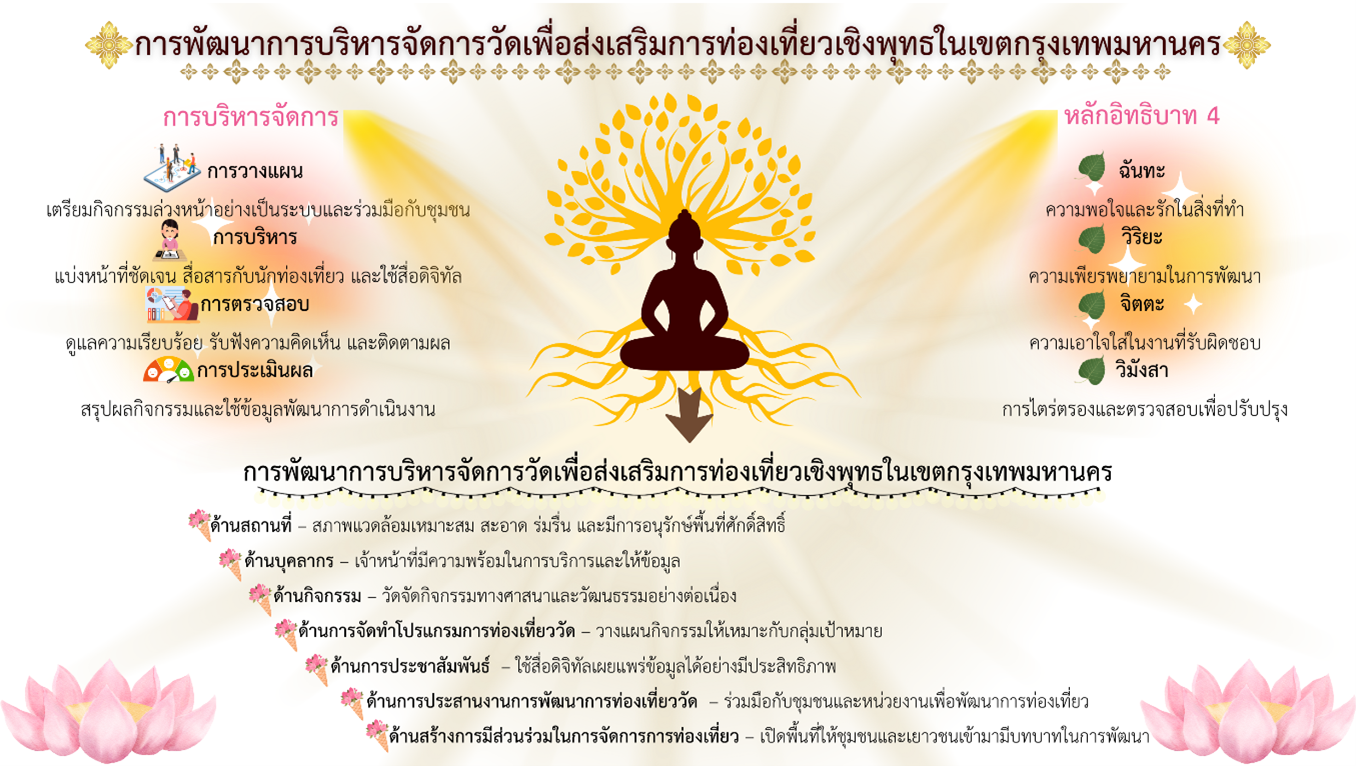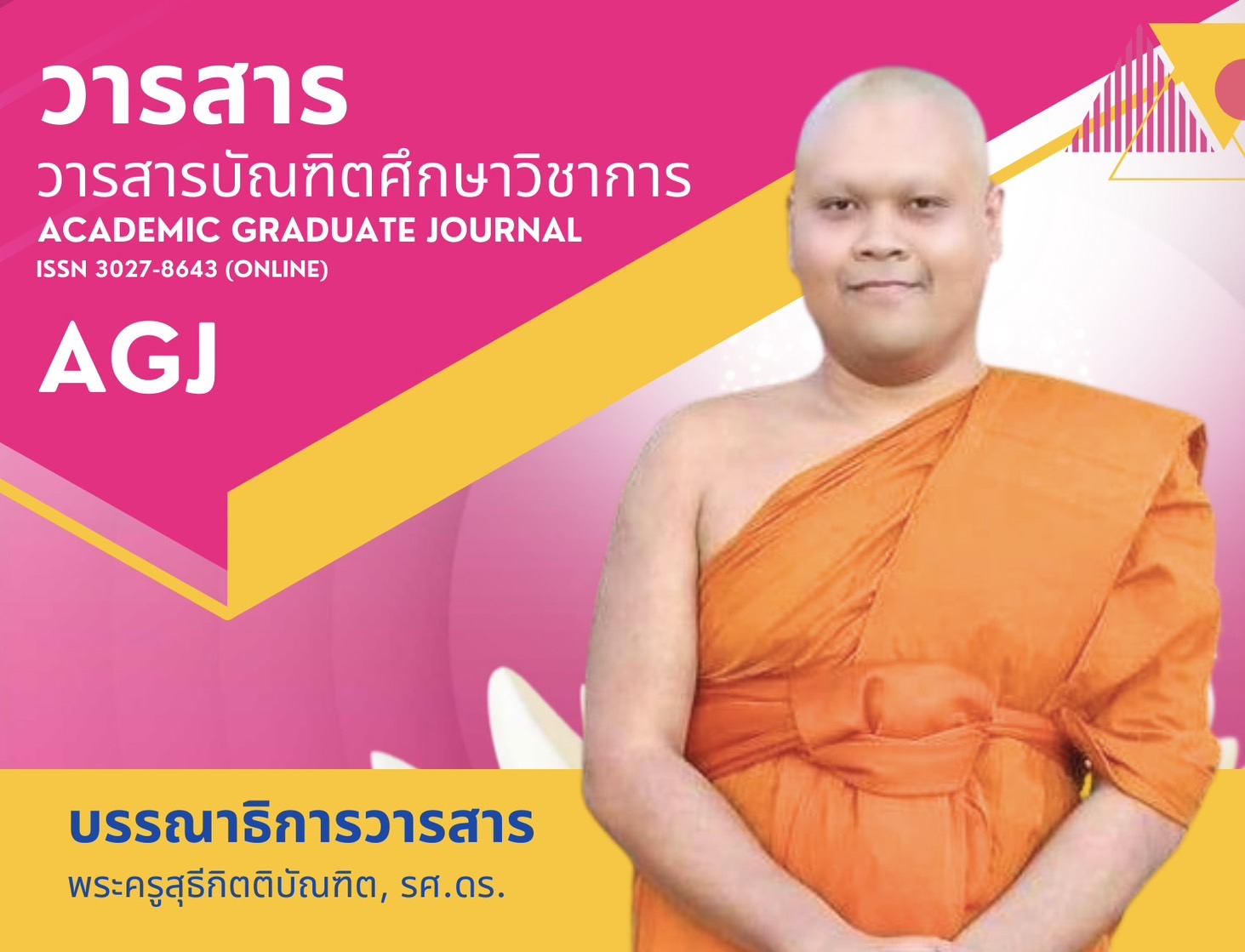THE DEVELOPMENT OF TEMPLE MANAGEMENT TO PROMOTE BUDDHIST TOURISM IN THE BANGKOK METROPOLITAN AREA
Keywords:
Buddhist Tourism, Temple Management, BangkokAbstract
This research article aimed to: 1. Explore Buddhist tourism in the Bangkok Metropolitan Area. 2. Examine the factors affecting Buddhist tourism in the Bangkok Metropolitan Area. 3. Propose the development strategies for monastery management to enhance Buddhist tourism in the Bangkok Metropolitan Area. The research employed a mixed method, consisting of: Quantitative research: Data were collected from 385 samples using a questionnaire with a reliability coefficient of 0.921. Qualitative research, In-depth interviews were conducted with 18 key informants. The findings were then synthesized and used in a focus group discussion with 10 monks or individuals to validate the results.
The research findings revealed that: 1. The overall monastery management for promoting Buddhist tourism in the Bangkok Metropolitan Area was at a high level (=3.97), The management aspects were ranked as follows: evaluation, administration, planning, and inspection. 2. Factors affecting monastery management for promoting Buddhist tourism in the Bangkok Metropolitan Area included the four management aspects inspection, planning, administration, and evaluation. All were statistically significant at the 0.01 level. Additionally, the Four Iddhipada: Chanda, Viriya, Citta, and Vimamsa, significantly influenced Buddhist tourism in the Bangkok Metropolitan Area at the 0.01 statistical significance level. 3. The development of monastery management for promoting Buddhist tourism should integrate Buddhist principles, especially the Four Iddhipada: Chanda, Viriya, Citta, and Vimamsa, to enhance monastery management for Buddhist tourism in the following areas: coordination, participation, facilities, personnel, activities, monastery tourism programming, and public relations.
References
กชนิภา อินทสุวรรณ. (2564). รูปแบบประสิทธิผลการบริหารจัดการการท่องเที่ยวเชิงนิเวศโดยการบูรณาการหลักพุทธธรรมของจังหวัดสมุทรสาคร (ดุษฎีนิพนธ์ปริญญาปรัชญาดุษฎีบัณฑิต สาขาวิชารัฐประศาสนศาสตร์). พระนครศรีอยุธยา: มหาวิทยาลัยมหาจุฬาลงกรณราชวิทยาลัย.
กรมการศาสนา กระทรวงวัฒนธรรม. (2557). แนวทางการดำเนินงานโครงการส่งเสริมการท่องเที่ยวเส้นทางแสวงบุญในมิติทางศาสนา ปี 2557. กรุงเทพฯ: กรมการศาสนา กระทรวงวัฒนธรรม.
กระทรวงการท่องเที่ยวและกีฬา. (2566). รายงานสถิติการท่องเที่ยว ปี 2566. กรุงเทพฯ: กระทรวงการท่องเที่ยวและกีฬา.
จิตกร วิจารณรงค์ และคณะ. (2566). การบูรณาการหลักพุทธธรรมเพื่อส่งเสริมประสิทธิผลการบริหารจัดการท่องเที่ยวของบริษัทท่องเที่ยวในกรุงเทพมหานคร. วารสารพุทธนวัตกรรมและการจัดการ, 6(2), 44–58.
ณัฏฐ์ณัชชา ไชยประเสริฐ. (2565). การบูรณาการหลักพุทธธรรมเพื่อส่งเสริมประสิทธิภาพการบริหารของบริษัท โทรคมนาคมแห่งชาติ จำกัด (มหาชน) (ดุษฎีนิพนธ์ปริญญาปรัชญาดุษฎีบัณฑิต สาขาวิชารัฐประศาสนศาสตร์). พระนครศรีอยุธยา: มหาวิทยาลัยมหาจุฬาลงกรณราชวิทยาลัย.
ธเดช ศรีสวัสดิ์. (2565). พุทธบูรณาการเพื่อการพัฒนาประสิทธิผลการบริหารจัดการศูนย์รับเรื่องราวร้องทุกข์ของรัฐบาล สำนักงานปลัดสำนักนายกรัฐมนตรี (ดุษฎีนิพนธ์ปริญญาปรัชญาดุษฎีบัณฑิต สาขาวิชารัฐประศาสนศาสตร์). พระนครศรีอยุธยา: มหาวิทยาลัยมหาจุฬาลงกรณราชวิทยาลัย.
ธัญญพัทธ์ ภูริพินิศนันท์. (2565). พุทธวิธีการจัดการการท่องเที่ยวเชิงวัฒนธรรมของจังหวัดพระนครศรีอยุธยา ดุษฎีนิพนธ์ปรัชญาดุษฎีบัณฑิต (ดุษฎีนิพนธ์ปริญญาปรัชญาดุษฎีบัณฑิต สาขาวิชารัฐประศาสนศาสตร์). พระนครศรีอยุธยา: มหาวิทยาลัยมหาจุฬาลงกรณราชวิทยาลัย.
ธานินทร์ ศิลป์จารุ. (2560). การวิจัยและวิเคราะห์ข้อมูลทางสถิติด้วย SPSS และ AMOS. กรุงเทพมหานคร: บิสซิเนสอาร์แอนด์ดี.
พระศรีสังคม ชยานุวฑฺโฒ (ธนาวงษ์). (2561). การท่องเที่ยวเชิงพุทธศาสนา : รูปแบบและเครือข่ายการจัดการท่องเที่ยวของวัดในสังคมไทย (ดุษฎีนิพนธ์ปริญญาพุทธศาสตรบัณฑิต สาขาวิชาการพัฒนาสังคม). พระนครศรีอยุธยา: มหาวิทยาลัยมหาจุฬาลงกรณราชวิทยาลัย.
มหาจุฬาลงกรณราชวิทยาลัย. (2539). พระไตรปิฎกฉบับภาษาไทย ฉบับมหาจุฬาลงกรณราชวิทยาลัย. กรุงเทพฯ: โรงพิมพ์มหาจุฬาลงกรณราชวิทยาลัย.
Deming, E. W. (2009). Out of the Crisis. Cambridge, MA: Massachusetts Institute of Technology.
Likert, R. (1967). The Method of Constructing an Attitude Scale. In Reading in Attitude Theory and Measurement. New York: Wiley & Son.
Thomas, K. W., & Kilmann, R. H. (1974). Thomas-Kilmann Conflict Mode Instrument. New York: CPP, Inc.
Yamane, T. (1973). Statistics: An Introductory Analysis (3rd ed.). New York: Harper and Row.







